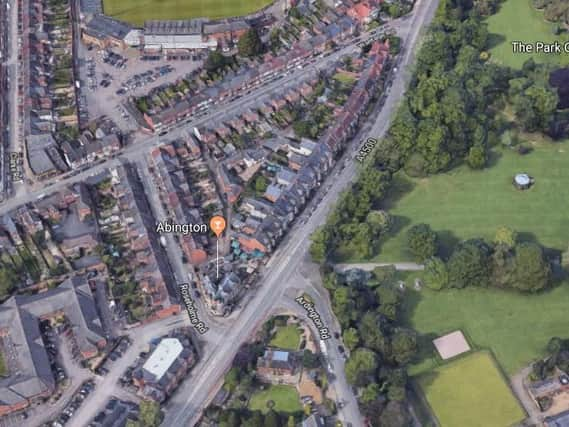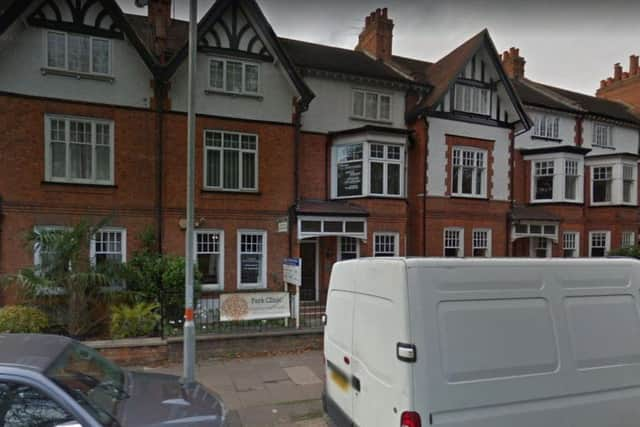Circumcision clinic in Northampton criticised for lack of follow-up care for children


Operating mainly as a dental surgery, Park Clinic in Abington House, Wellingborough Road also offers circumcision carried out by a urologist, mainly for children for religious, cultural and medical reasons.
However an inspection by the Care Quality Commission (CQC) found that the clinic did not follow all the rules when it came to aftercare, although the the service had been voluntarily suspended to review registration requirements.
Advertisement
Hide AdAdvertisement
Hide AdThe report says: "We noted that clinical records for patients having circumcision were brief. Information about medicines used in the procedure such as local anaesthetics were not recorded.


"In one example only the child’s first name had been recorded. We saw that information about the procedure was not routinely shared with the patients’ GP’s. The records showed there were no formal follow-up appointments offered to patients or their parents."
The records showed that no circumcision procedure had been completed since 31 July 2018 but 89 circumcision procedures had been completed in the year up to 31 July 2018.
Inspectors went on to say that there was no evidence or process in place for the provider to show that they assessed or considered that the adults had parental authority to give consent to the circumcision. In many examples only one parent had signed the consent form, guidance requires consent to be received from both parents where applicable.
Advertisement
Hide AdAdvertisement
Hide AdThe report said services were caring towards patients - most of who, when interviewed were positive about the clinic - and met their needs.
But inspectors were unimpressed with the overall leadership, effectiveness and safety of the clinic, ordering enforcement action in all three areas.
Other findings by the CQC included:
- areas of the practice did not appear clean.
- not all appropriate medicines and life-saving equipment were available.
- clinical waste segregation and identification was ineffective.
Advertisement
Hide AdAdvertisement
Hide AdIn response, the registered manager, Akhtar Zeb Jan, made the following response:
The records showed there were no formal follow-up appointments offered to patients or their parents:
There are two types of circumcisions:
a) Plastibell (ring method): This is a very minor and safe closed procedure. We give written post-operative instructions to the parents,including out-of-hours number to contact us. Parents do not attend for review appointment, but we have an open door policy and encourage parents to contact us with any concerns. We see patients the same or next working day if there are any concerns. Our audit studies show “Zero complication rate”.
b) Surgical circumcision (only used for older children): Patients are provided with post-operative written instructions and an appointment following a week prior to the list but no one attended as dissolvable sutures are used.
Advertisement
Hide AdAdvertisement
Hide AdCQC was given very comprehensive information last year, addressed to the inspector prior to her inspection in November 2018. It seems that the inspecting team overlooked this information, which is very concerning.
We provide a letter which is given to parents to keep in the baby’s red book to be given to health visitor and GP.
The records showed that no circumcision procedure had been completed since 31 July 2018 but 89 circumcision procedures had been completed in the year up to 31 July 2018:
This was again an error made by the inspector. The 89 circumcisions were done over the course of three years, not one year.
Advertisement
Hide AdAdvertisement
Hide AdThere was no evidence or process in place for the provider to show the assessed or considered that the adults had parental authority to give consent to the circumcision. In examples only one parent had signed the consent form, guidance requires consent to be received from both parents where applicable:No procedure is undertaken without consent of the parents or legal guardians. We check the ID of the patient and parents during pre-consultation. A copy of our informed consent form can be presented upon request.
Areas of the practice did not appear clean:
The only area these comments refer to is the operating theatre. This room is cleaned regularly, although not usually in clinical use. When I asked the inspector to show me where it was not clean, she replied that the table had rust and collected dust. However, she did not show me the unclean area when I asked to see it for myself. I can provide photos of the table showing paint wear (not rust). Apart from aesthetic appearance, it has no clinical significance.
Not all appropriate medicines and life-saving equipment were available:
Our stock of emergency drugs was, in fact, more than required. Furthermore, the inspector asked me to remove:
1) Atropine
2) Chlorphenamine
3) Solu-Cortef
Advertisement
Hide AdAdvertisement
Hide AdThe inspector then asked me to check the list on the CQC Web-site, which on the contrary, is inclusive in the Emergency Drug List. We are well aware about the BNF list of emergency drug list for dental practices. We treat medically compromised patients that those not treated in hospital for restorative treatment. Buccal Midazolam comes under control drug act and has to be kept in lockable container with medication used for sedation. It is available when required.
Clinical waste segregation and identification was ineffective:
Inspectors missed one clinical consignment note and felt that waste segregation was ineffective. We take waste segregation and hygiene very seriously.
I emailed the head inspector with my concerns about the inspection. In response to my report: